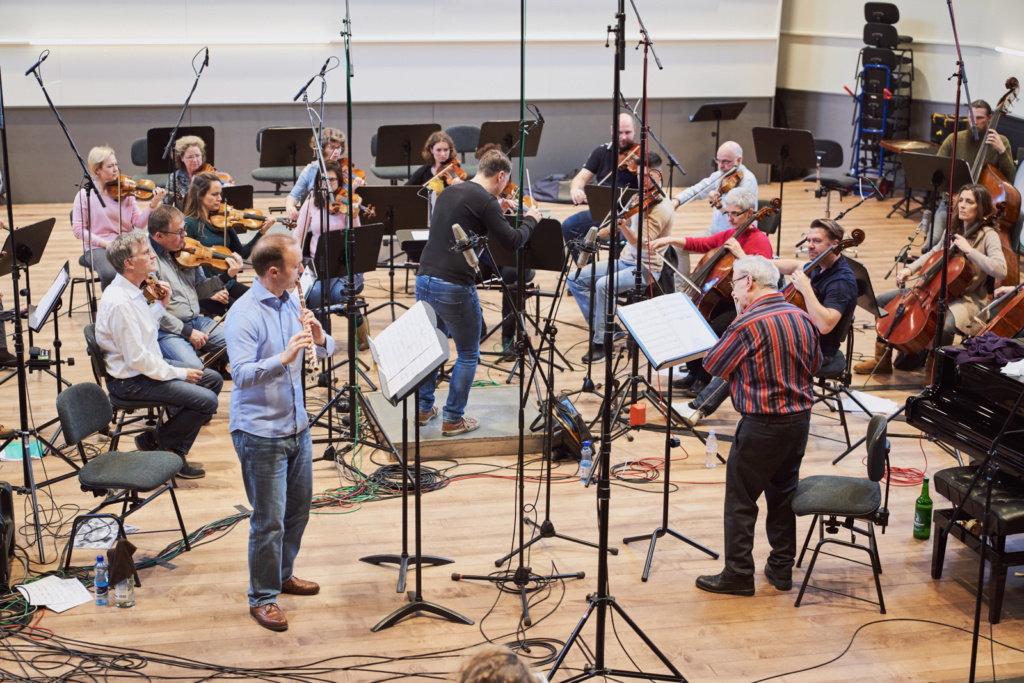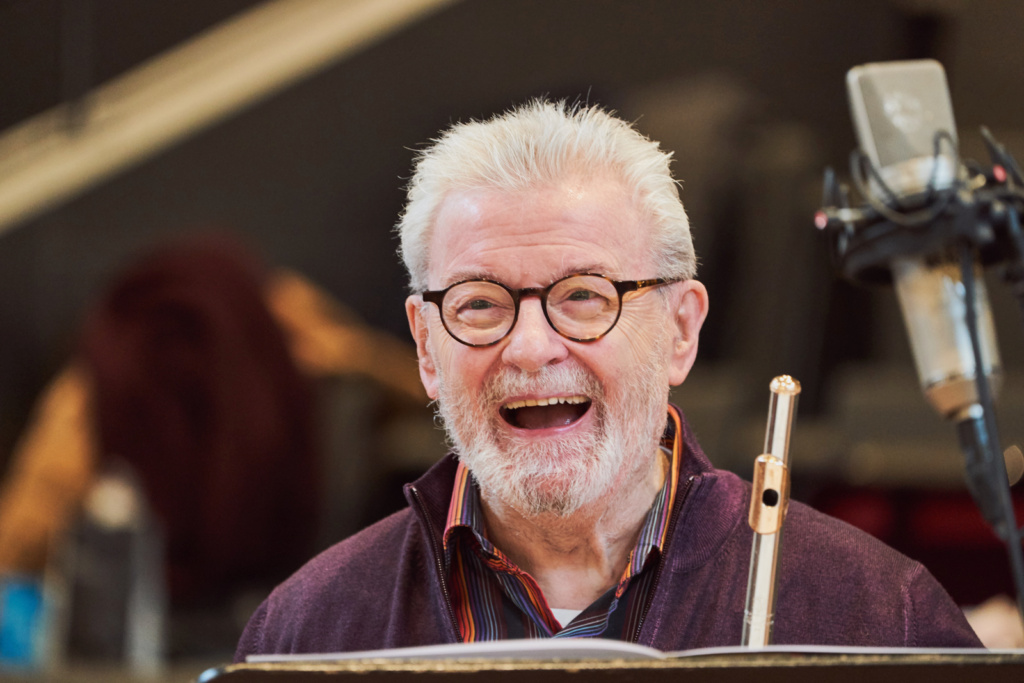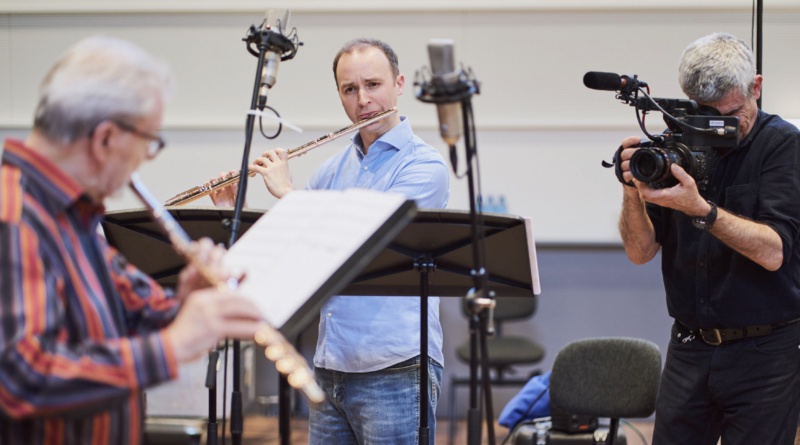New Album Feature: Philipp Jundt’s Shades of Love
Philipp Jundt has been shuttling between the continents of Asia, Europe, and America for over a decade. With the warmth of his tone paired with great dynamic expressiveness, the Swiss-born flutist inspires audiences worldwide. Multifaceted concert programs with premieres and arrangements from the song and violin repertoire make Philipp Jundt’s concerts an extraordinary experience. He is passionately dedicated to historical performance practice as well as its research and contemporary music. In addition to his concert activities, Philipp Jundt holds a professorship in Korea as well as in Switzerland.
The album Shades of Love is a project that you have realized with the German composer Marco Hertenstein. How did the idea of making an album dedicated to the soundtracks of Kdrama come about?
When I came to Korea in 2008 for the first time, I watched Korean Films and TV Dramas in order to learn about the culture and to get to know the language. I got quite addicted to watch TV series, but at this point I didn’t think about playing the music. My close friends called me “TV Drama Ajuma” as I even watched and enjoyed some of the cheaper produced lunch time series.
After a couple of years living in Korea, I remember a meeting with my agency Bom Arts Project, where I mentioned, that I wish to do something artistically which connects me more deeply to korea and to modern Korean culture. Bomarts suggested, why not playing some Korean TV Drama OST, as I am such a big fan of those films. The first two songs I arranged back then where “Always” from Descendents of the Sun and “B-Rosette” from White Tower. Later on, we did the Dramatic Classic Concert and slowly the CD Project Idea was born. This project developed over many years, we experimented during several concerts on songs, arrangements and combinations of instruments.
I had two goals in mind with this Album:
In the Korean music world, mainly western music is played by Korean musicians. My goal was to have western musicians play entirely Korean music. Furthermore, all musicians on that CD, including the orchestra have a personal connection to Korea and a personal connection to me in Korea. With most of them I performed here and shared personal and beautiful memories.
It is important to me to make this musical statement and to have a gesture of gratitude dedicated to this country which has giving me so incredibly much during the last years.


Personally, the twelve years I spent living in South Korea made a deep impression on me. I immersed myself unconditionally in a world that was, to begin with, entirely alien to me. I wrestled with myself and my values, I questioned everything and continued to struggle, but eventually I set myself free. That new sense of freedom affected my approach to music and my dealings with other people, but also the way I saw myself. In the process of getting to know a culture that seemed so different at first, my view of my own artistic and cultural background changed, becoming broader and deeper.
This album is a hymn that connects my two lives. It’s a poetic way of bringing together friends, music and emotions from both worlds. This CD I would call it a hymn to live.
Which are the criteria that you use to choose the songs of the Kdrama?
The arranger, Marco Hertenstein and me, went through a long and extensive selection process. Both of us listened to far over 2000 songs. Independent of each other we cut down to about 200. When we compared our notes, we found about 100 songs in common. Our approach was very different. Marco Hertenstein was mainly interested in the composition, in the structural substance and quality of the pieces, and in the practicability of arranging for a classical setting.
I was mainly interested in melodic and emotional aspects, I looked at them from an instrumentalist’s point of view.
After further discussions we arrived at about 30-40 songs which we absolutely loved. Legal rights issues where quite complicated, cutting down the list furthermore.
There is about 20-30 songs left which I still would absolutely love to record, perhaps another time. It was hard to cut down to 15 only.
Your interpretation is very beautiful and touching. How do you feel while you are performing this song?
The song “stay with me” is actually a rap song, very far apart from a flute piece. We found a quite creative but time-consuming solution. I recorded 6 different flute voices, and we added a sub-countabass flutist who also improvised the flute, in free hip-hop style. This flute has a tube of over 5 meters and is about 20 cm thing. It’s a very rare instrument and hard to play.
It’s simply a lot of fun to play this song!
You had lived in Seoul for twelve years, you know the Hangul and you had also taught music at the Weimar German Music School in Seoul. Do you have some pleasant memories that you would share with us about your stay in this city?
My first contact with Korean culture was over food: as a university student I lived next to munich’s (back then) only Korean restaurant. It was one of those street food stile Shikdang’s. They served 5 different dishes. As I was usually short on time, I ate there several times per week and I absolutely loved it. My friends joked about me, that due to my love for Korean food, they could guess my presence in the school, due to the unusually high amount of garlic in those dishes.
Later when I actually was sent to korea by my german university as a professor of flute, German School of Music Weimar, those same friends where suspecting, I only would go to korea for food again. I have to admit, until now, korean food is my favourite but I also fell in love with Korean people, friends, films and daily live.
I do think korea changed a lot over the last decade. It became calmer, yet, there is a noticeable discrepancy between the younger generation, having a different vision for the future of the country and the culture than the elder generation, who lived during more difficult times.
I am curious where this will take us in the next couple of years.
What do you think of the Kdrama soundtracks?
During our recording, Richard Youngjae O’Neil said it beautifully: “the quality of Korean film music is extremely high. Film is the modern literature, we capture so much in movies. Music can completely change the meaning of any film scene, it is the most powerful tool of filmmaking”. Korean film music has found its very own style. A mix between the great lyrical and melodical elements of Italian film music and the more descriptive US film music, which is influence by R. Strauss, Mahler, great musical story tellers.
During your career you have collaborated with many musicians, what are Korean musicians like?
Korea has one of the most advanced and dynamic music scenes worldwide. Generations of Korean musicians studied in Germany, USA, France, Uk…and brought their knowledge and style back to Korea. This led to a very diverse musical ecosystem, a mix of style from all over the world. Unlike in European countries where the definition of style is a very narrow one, Koreas music world is open to all different ways of doing music. In my opinion this has led to a honest and very natural approach over classical music. Korean players and Korean audiences are vastly emotional, they react to true feelings and the true message of music, independent of style and short term trends.
Sometimes I wish, students would spend a bit more time researching about the pieces and the composers they are playing, but this is made up for by an impressive range of emotional capabilities.
Ennio Morricone was a great soundtracks composer, he made the history of cinema with his works of art: he created a unique connection between melody and image. Do you think the same thing can also happen with Korean kdrama music?
I think this already happened. Kdrama has its own language, a combination of Italian operatic melody and German almost Wagnerian story telling.
What would you recommend to young people who want to pursue a musical career?
I have been teaching students in Korea for over 12 years. There are quite some differences between the Korean and the Swiss/German education system.
Generally, western people have a strong prejudice and cliché that “korean students are extremely technical and disciplined but not creative”. I cannot really confirm that cliché! I find Korean mentality and music making one of the most emotional worldwide. People clearly show their feelings openly, which can also be seen in TV Dramas actually. People cry, yell, love, laugh and suffer quite openly. This clearly shows in music making, Korean musicians move a lot on stage and play very actively and emotionally involved. Self-discipline however, is more of an issue than I expected before coming here. Students are used to be told what to do, therefore independent work is quite hard for young korean kids compared to their European counterparts.
One of the major differences, and my only real criticism on the Korean music world, is the lack of curiosity about music science and music history. Music is not only emotion and technic, it is also structure, style, harmonic setting, the composer’s message, etc. Without a deep understanding of how the music is built, of when and by whom it was written, of what where the habits during that time at that place, it is hardly possible to give a honest interpretation of classical music pieces. We don’t play our own music, we play someone else’s. I think, Korean universities and professors should invest more time in educating their students in more general music sciences and arts, rather than letting students creatively play whoever they like. Therefore, in a sense, I recommend Korean students to be more technical, more self-disciplined and less “creative”, against the common cliché.
Do you have a favorite K-Drama?
I have watched many dramas: If I had to recommend one series for both good plot and good soundtrack I would go with Goblin. The Music is incredibly rich and multi-layered. The plot is almost like a poetic fairytale, symbolic and deep, yet emotional and catching. Great plot, great music and great acting.
One of my favourite series is Crash Landing on you, I remember that I called one of my Korean friends just after the final episode had aired: I was travelling and couldn’t watch it, but I absolutely needed to find out, whether it had a happy ending or not.
“Descendants of the Sun” and “Goblin/Dokebi” both have an incredible amount of top quality songs which I would have loved to add to the CD, but we had to keep some healthy balance with other music from the last decades. I think both of those series have enough great music for a full CD by themselves.
In the end a little curiosity: Do you like Korean food? If so, what is your favorite dish?
1. kanjang kaejang
2. Gamja Tang
3. maeun tang
